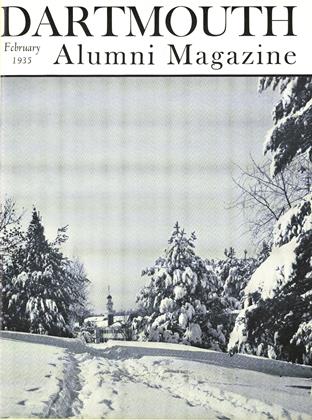A professor at New York University employing a two-way ultra short wave radio system has been lecturing his classes from his home a quarter of a mile away, thus escaping yawns and inattention and giving the boys a novelty in the way of mechanical instruction. There is much to be said for this system particularly if the professor knows his class, as this one seems to do, and chides well-known figures here and there for falling asleep. But if the inventors bring television within the range of academic possibility the system will be much nearer perfection. One has an uncanny feeling in a modern newspaper office to see a mechanical typewriter grinding out a story and to realize that the operator, sitting at a distance of some hundreds of miles, possibly thousands, is writing his story for fifty or seventy-five or a hundred newspapers at once. There is also an uncanny feeling about a professor sitting in his study and lecturing to a hundred college classes at once all over the country.
Students often remember the most curious things about courses, and not at all what they were expected to remember. Men out of college for many years can tell you that a certain professor of old times wore a different colored vest at each lecture, that another had a Viking beard, that another cared much for his appearance, and another cared nothing. They remember the way certain instructors held cigarettes or pipes, the way others quelled epidemics of throat-clearing or coughing. What becomes of a professor's favorite story when the lecture goes on the machine? By such things as these students have remembered that professors are human beings, and by such things they have gathered liking and even affection for the men who taught them. There is even inspiration in this. Can the cold-blooded machine equal it?
 View Full Issue
View Full Issue
More From This Issue
-
 Article
ArticleHANOVER BROWSING
February 1935 By Herbert F. West '22 -
 Article
ArticleForgotten Dartmouth Men
February 1935 By Prof. H. F. West '22 -
 Class Notes
Class NotesClass of 1930
February 1935 By Albert I. Dickerson -
 Class Notes
Class NotesClass of 1908
February 1935 By L. W. Griswold -
 Article
ArticleTHE DARTMOUTH EYE CLINIC
February 1935 -
 Class Notes
Class NotesClass of 1934
February 1935 By Mariin J. Dwyer Jr.
The Editors
-

Former Reasons to Love Dartmouth
SEPTEMBER | OCTOBER 2023 -
 Article
ArticleGRADUS AD PAMPASSUM
November 1934 By The Editors -
 Article
ArticleThe Cover
December 1934 By The Editors -
 Article
ArticleReligion on the Campus
December 1934 By The Editors -
 Article
ArticleOf Much Promise
February 1935 By The Editors -
 Article
ArticleThe Cover
February 1935 By The Editors








